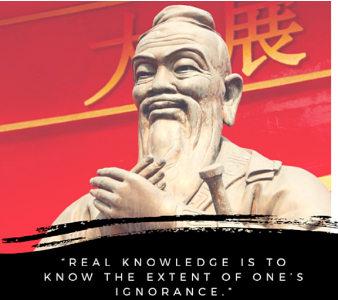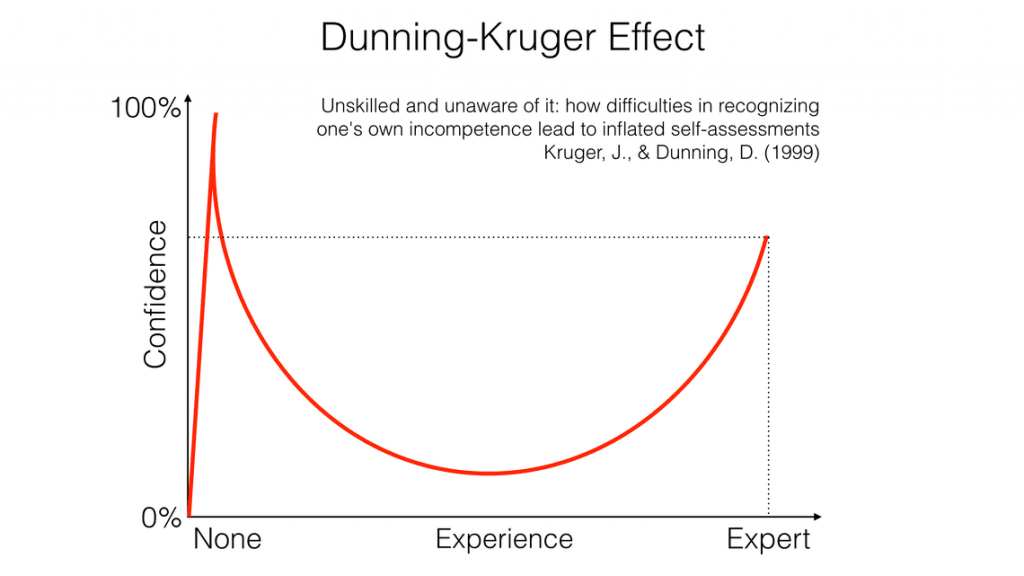We all know someone who thinks they’re better than they are. Here’s what’s going on:

The strange phenomenon of false superiority has been noted by the great thinkers throughout history. The philosopher Confucius (571-479 BC) said, “Real knowledge is to know the extent of one’s ignorance.”
Several centuries later, philosopher and mathematician Bertrand Russell (1872-1970) wrote, “One of the painful things about our time is that those who feel certainty are stupid and those with any imagination and understanding are filled with doubt and indecision.”
This is called the Dunning-Kruger Effect
In 1999, two leading American psychologists, David Dunning and Justin Kruger presented an investigation of the inability of low-skilled people to recognize their shortcomings in a study called Unskilled and Unaware of It: How Difficulties in Recognizing One’s Own Incompetence Lead to Inflated Self-Assessments
They were inspired by the case of McArthur Wheeler who robbed banks with his face soaked in lemon juice, which he believed would make it invisible to the security cameras. This belief was based on his faulty reasoning that, as lemon juice works as an invisible ink, it would have the same effect on his facial features.

The tendency to overestimate our own competence shows up time and again in studies of reading comprehension, the practice of medicine, car driving and playing games and sport.
The strange flipside to this, as Bertrand Russell suggested, is that highly competent people are filled with insecurity about their skills.
The reason is that complex tasks are relatively easy for them, and they assume everyone else finds them easy too. Their misjudgement stems from an error about others, while incompetent people misjudge themselves.
Although most of the research has been conducted among American subjects, a further study in 2001 showed that the phenomenon exists in Japan too. There’s every chance that this a world-wide, cross-cultural human weakness.
The four stages of competence
The good news, especially in the business context, is that training helps people to overcome their misconceptions. As David Dunning said,
“If you’re incompetent, you can’t know you’re incompetent…the skills you need to produce a right answer are exactly the skills you need to recognise what a right answer is.”
David Dunning
Psychologists who specialise in the field of learning, use a model called the Hierarchy of Competence to demonstrate the various stages of learning.
- Unconscious incompetence
At the lowest level, individuals don’t know how to do a particular task and they’re unable to recognize this lack of skill, or they may claim the skill has no value. They will remain at this level until they’re motivated to learn. - Conscious incompetence
They’ve moved off the baseline. They still don’t know how to complete the task but they recognise this and understand the value of learning a new skill. - Conscious competence
They can now perform the task, but demonstrating their new-found knowledge and skill requires concentration and may have to be performed step-by-step. - Unconscious competence
The skill has been fully mastered and can be performed easily. Depending on how and when it was learned, they may be able to teach it to others.
A little learning is a dangerous thing

“A little learning is a dangerous thing.”
Alexander Pope (1688-1744)
So said Alexander Pope (1688-1744), the famous English poet. Modern research suggests he knew what he was talking about.
A survey sponsored by the Association of American Colleges and Universities produced some interesting results that confirm the findings of Dunning and Kruger, and the wisdom of Pope.
Among college students questioned in the survey, 64% said they were well prepared to work in a team, 66% thought they had adequate critical thinking skills and 65% thought they were proficient in written communication.
However, among employers who had recently hired college students, less than 40% agreed with any of those statements. The students thought they were much further along the learning curve than their future employers did.
Whenever you feel you’ve mastered a skill, remember the words of singer Sonya Teclai:
“Continue to learn. What you know will never be enough.”
Sonya Teclai
If you liked, then please subscribe to our YouTube Channel for video content. You can also find us on Twitter, Facebook, Instagram and Linkedin.




